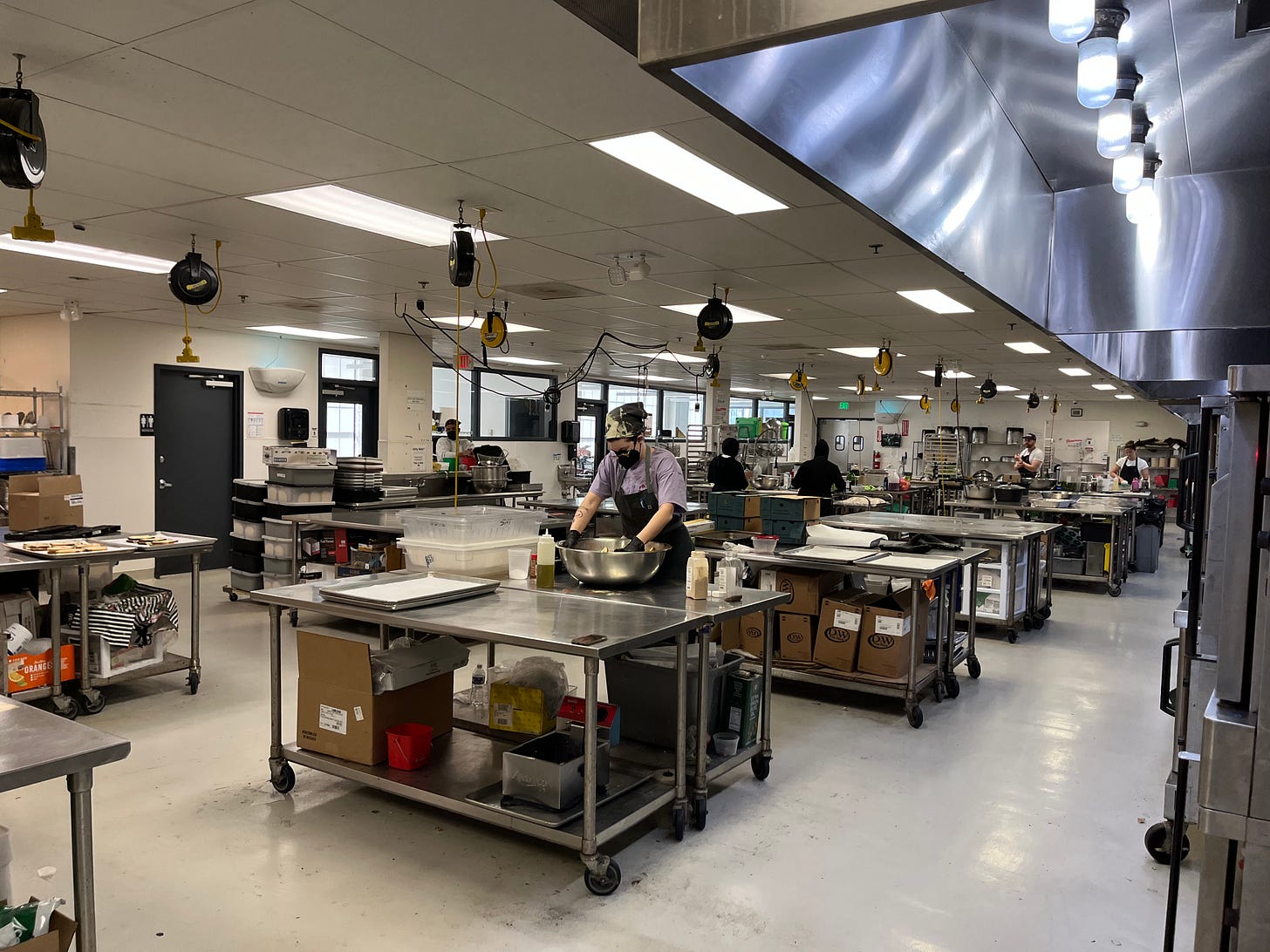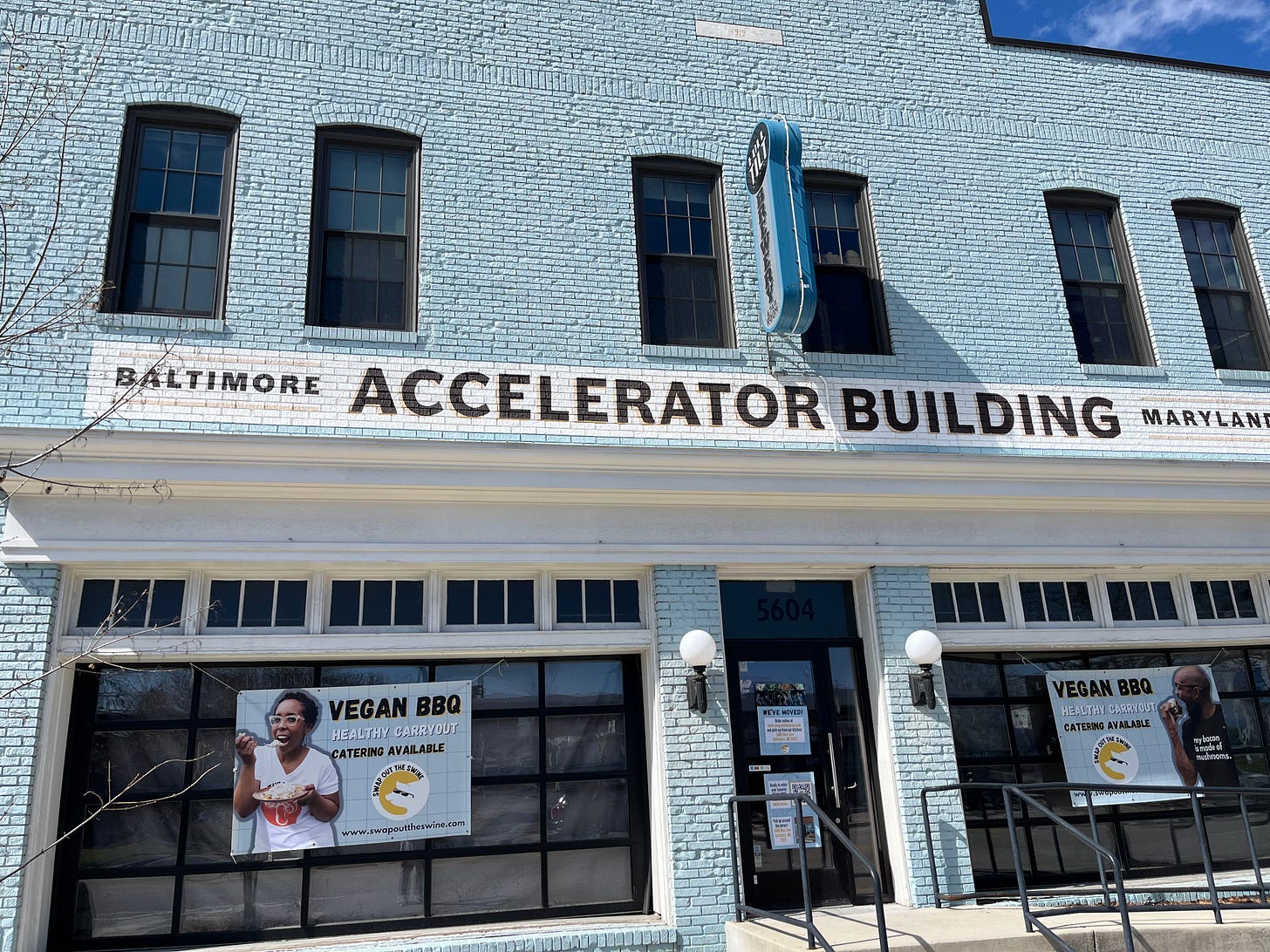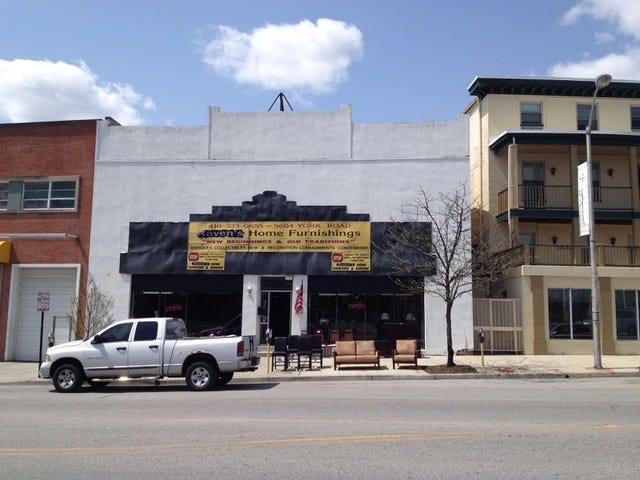Accelerator Building leads the way in transforming York Road’s car-related properties
A former dealership now powers Govans’ food economy

The traffic count in Govans comes to about 6 million vehicles a year, which goes a long way toward explaining the concentration of dealerships, tire stores, service stations and auto-body repair shops that have historically defined the York Road Corridor. But in a future shaped by the growing popularity of tele-work, ride-sharing and low-maintenance electric cars, new land use patterns will be needed, especially the repurposing of properties left over from the golden age of gas-powered engines.
This trend is already at work, and no better example can be found than at the Accelerator Building, a former Chevy dealership that is now home to a co-work kitchen shared by two dozen food businesses, an event space that can seat 250 guests and a fully equipped brewpub that is ready for its next tenant.
At the heart of the operation is B-More Kitchen, which was started by Jonathan Fishman, a Yale-trained architect who bought the property nearly 10 years ago. “This building was sitting on the market and I could see that it had good bones,” he recalls. “And at the time, the concept was to build this kitchen facility.”
His wife, Gail, has been developing a business out of their home, making granola. “I started going around with her to events and farmers markets and meeting all these other people with small food businesses,” Fishman says. “One of the things I learned was there was a problem with finding production space” that could meet Health Department requirements.
“I’d seen a facility like this in Washington, D.C., and I thought, ‘I could do this.’”
Renovation of the 28,000-square-foot structure required extensive effort. The modernization project included a fire suppression system, a walk-in refrigerator and a walk-in freezer as well as new bathrooms, elevators and lighting. A new staircase was created. Upstairs the wooden floors were sanded to reveal their handsome grain while damaged sections were replaced with the same kind of wood, maple. New windows were installed, designed with industrial sash to match the original. Some of the exterior brickwork had to be restored, and all of it was painted.
Since the incubator kitchen opened in 2016, roughly 150 businesses have cycled through, Fishman says. The current roster includes A Friendly Bread, Baltimarons, Black Baltimore Vegan, Chefrocks, Cozy Cookies, Fit Prep, Hiatus, Highland Graze Co., Love & Cornbread, Meat The Mushroom, Minis & More Catering, Scratch Made, Syriana Cafe, Taste This Cake and Wight Tea Co.
On any given day, a different mix of food entrepreneurs can be seen working their way among the stainless steel prep tables and industrial ovens. “Out in that kitchen, there are like multiple different organizations that are at work,” Fishman says.
While the kitchen is busy, Fishman says there is room for more food companies as flexible schedules allow for efficient use of the available space. The kitchen users are called “members,” and they operate on their individual cycles. One member may start its week on a Saturday, “and then their delivery days are like Tuesday and Wednesday,” Fishman explains. “And then they’re gone for a couple of days, and then they’re replaced by another member.”
COVID claimed a few casualties, including the Full-Tilt Brewery that once occupied the front of the building on York Road. Fishman sees great potential in that space, although he notes that the craft brewing field has evolved and a new kind of user may emerge. “We need to get that space filled with the right tenant,” he says.
COVID’s effect came in two waves. The first one was hard, but then things started to flow the other way.
“During the pandemic hit, a bunch of businesses here threw in the towel,” Fishman says. “And then over the next six or 12 months, we actually started getting people coming in, because there was a need for this. People were still eating, and they were eating at home and so the businesses that stayed actually became very stable.”
The current level of business “actually has more stability now than our first few years,” says Fishman, who serves on the board of the York Road Improvement District.
As in any industry, food startups face a raft of challenges, and some of the entrepreneurs who have worked out of the Accelerator Building have opted to close down. But for one local mainstay, HEX Ferments, the space served as a critical waystation, helping it to transition from a small stand at Belvedere Square to a standalone production facility and retail store, known as HEX Superette, at 5718 York Road.
Shane Carpenter cofounded HEX with his wife, Meaghan. They were at Belvedere Square from 2013 to 2020 and then worked out of the Accelerator Space. He says the time in the Accelerator Space was “instrumental in our growth” and brought home the need for the company to acquire its own building, which it did in 2022.
“We’ve been in other kitchens, but we definitely love B-More the best,” says Aleah Montague. Along with her husband, Marvin, she runs two businesses, Meat The Mushroom and Swap Out The Swine, at B-More. Both companies offer a mushroom-based bacon substitute.

“As a food entrepreneur, you wear so many hats. There’s so many things to juggle,” she says. “Being in a shared space like that, with owners that care about the space, that manage it as well as they do, then it’s basically one more thing off your plate so you can concentrate on growing your business.”
The Accelerator Building went up in two phases, starting in 1919 as part of what was Govans Motor Co. and then later became Jerry’s Chevrolet. It doesn’t have a lot of street frontage, but it stretches back 250 feet and has a nifty ramp leading up from Benninghaus Road that provides easy access to the second floor. This area was originally an indoor storage lot for cars that were waiting to be sold. It’s now an event space that encompasses two separate rooms and an outdoor patio.
The structure sits on the corner of York and Bellona. Thanks to an off-rhyme advertising jingle that seemed to play as an endless loop on local radio in the 1960s, it’s a location that lives in the minds of many older Baltimoreans as the “best place to become a Chevrolet ownah.”
It’s not the only well-known spot on York Road that is moving out of the automobile age. About a half-mile to the south, in the 5100 block, the old Sherwood Ford dealership has been taken over by Loyola University Maryland, which is using federal and state funds to turn the site into a community hub.
“Spring 2026 is when we hope that the space is open,” says Gia Grier McGinnis, executive director for Loyola’s Center for Community, Service and Justice (CCSJ) and the York Road Initiative.
Community organizations have already been using a conference room there, but the renovation will lead to “a much nicer gathering space for people [that] will allow us to do programs and ways of getting people to gather together,” McGinnis says. The facility will include a community partners suite “so some of our partners will get to have access to workstations.”
After Jerry’s moved to Baltimore County in 1971, Fishman’s building had a variety of occupants, including a construction company that kept its heavy equipment there. The structure held a second-hand furniture store when Fishman acquired it.

“The building has been underused, and no one had invested anything in the building for decades,” he says.
In Fishman’s view, the ability to attract new investment is the key to the future growth of the York Road Corridor. Drawing that investment will likely require a further disentanglement from the community’s history as a transportation route.
“York Road is too much like a highway,” Fishman says. “I really do think they could do a lot with calming traffic, just because I've seen what they've done in other parts of town. They've created bike lanes or parking areas, and they’ve installed stanchions that narrow the roadway.”
He acknowledges that it’s a complicated issue and that policymakers will have to factor in the movement of buses and emergency vehicles.
“But nevertheless,” Fishman says, “[York Road] could definitely be modified if the city would focus on it.”





